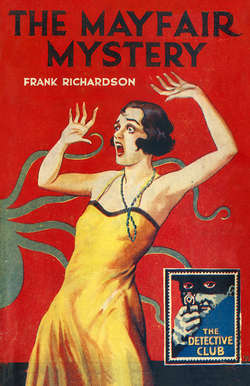Читать книгу The Mayfair Mystery: 2835 Mayfair - David Brawn, Frank Richardson - Страница 11
CHAPTER VI THE TROUBLE WITH MINGEY
ОглавлениеTHE next morning, when Harding reached his chambers in King’s Bench Walk, he noticed that his clerk, Mingey, was looking more dismal and lugubrious than usual.
Were it not that the man was so excellent at his business, Harding could not have tolerated the presence of so lamentable a figure. Mingey was six feet tall, intensely lean, with a dank, black, uncharacteristic, drooping moustache, and a pallid face that looked as if it required starching. He always wore shiny black clothes, and presented the appearance of an undertaker with an artistic taste in his calling. Today there were red rims round his colourless eyes.
‘Cheer up, Mingey,’ said Harding, heartily,
‘this is not your funeral, is it?’
‘Excuse me, sir, but something terrible has happened…my daughter, sir.’
‘Ill, is she?’ inquired Harding. ‘I’m very sorry…’
He went to the table and cast his eyes over his briefs.
‘Worse than that, sir,’ replied the clerk, ‘she has disappeared.’
‘Disappeared!’ echoed the K.C. ‘Perhaps she has eloped,’ he suggested.
‘No, sir, she is not that sort of girl. She never had, to my knowledge, any love affairs. She once did show a sort of feeling for one of our ministers, but he turned out to be engaged to a lady in Scotland, so nothing came of that.’
‘Tell me all about it,’ said Harding, seating himself at his table and preparing to listen.
Succinctly the clerk made his statement. His experience of the Law courts enabled him to do a very unusual thing. He told a simple story in a simple way. It appeared that Miss Mingey was devoted to the creed which her father had discovered was, of all creeds, the most suited to his spiritual wants. [Mr Mingey was, by persuasion, a devout Particular Strict Baptist: an intensely select creed with only two places of worship, one in Peckham and the other in Monmouth Road, Bayswater.] An entirely good girl. She took no interest in clothes or young men. She was, as her father put it, ‘an intellectual girl much given to book-learning.’ As to her appearance, even paternal pride would not enable him to say that she was good-looking.
‘Here is her photo, sir,’ he added to prove his statement.
But the photograph did not quite bear out his contention.
Harding gazed at it intently.
It represented a girl of about twenty—nineteen Mingey maintained was her actual age. Her features, so far as one could judge from a full-face photograph, by a cheap and inadequate practitioner, were regular; she wore spectacles; her hair was done in an unbecoming way; her dress was abominable. It was rather clothing than clothes. With no evidence as to her complexion and her figure one could not say whether the girl was good-looking or plain; but the fact that she took no trouble with her hair, that her dress stood in no relation to the fashion—even, so far as he knew, to Bayswater fashion—that she was photographed in spectacles, proved that she regarded herself as unattractive. A girl who takes this view is almost certain to be right.
He handed the photograph back.
According to the father’s story, after a meat-tea with her mother she had gone out to post a letter. She did not return.
‘She was happy at home, Mingey, was she?’
‘Perfectly, sir. She always attended service twice on Sundays. No, I have never known a girl who was happier, or who had more reason to be happy.’
‘Quite so,’ said the K.C. ‘And no affair of the heart, you say?’
‘Certainly not, sir.’
‘But as to the minister who married the Scotch lady?’
‘Sarah had too much self-respect, sir, to get mixed up with a married man. Directly Mr Septimus Aynesworth married, she—so to speak—cut him out of her life.’
‘Did you go to the police-station?’
‘First thing this morning, sir.’
‘Well, my dear Mingey, I shouldn’t be alarmed if I were you,’ he said, trying to administer consolation. ‘It may be some curious freak…some girlish whim. You will probably find her at home when you get back.’
Mingey shook his head.
‘I’m afraid not, sir. You’ve noticed there have been two mysterious disappearances lately of young girls. They both met their death. There are always three of these things! Sarah will be the third.’
Shaking with grief, he shambled to the door.
‘Wait, wait, wait!’ cried the banister.
‘Surely, surely it was to her that I gave a letter of introduction to Sir Clifford Oakleigh the other day. What did you say the matter was? Her nerves, wasn’t it?’
‘Yes, sir, nerves. It was wonderful the way he put her right then and there. And no charge, sir, to a friend of yours, sir. He’s a wonderful man, sir. She only paid one visit and he cured her completely.’ Woefully he added, ‘And to think it was all no good.’
Then he went out of the room.
